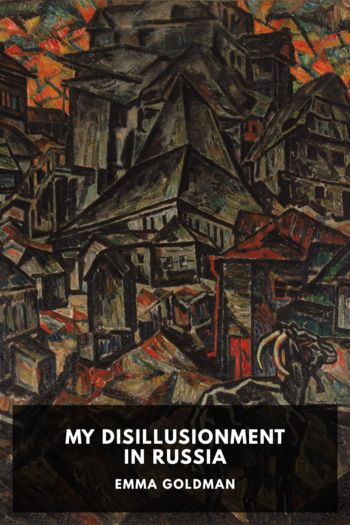My Disillusionment in Russia Emma Goldman (the beginning after the end read novel TXT) 📖

- Author: Emma Goldman
Book online «My Disillusionment in Russia Emma Goldman (the beginning after the end read novel TXT) 📖». Author Emma Goldman
The expedition was to proceed to Petrograd the next day, but Louise begged me to remain for the funeral. Sunday, October 23rd, several friends rode with her to the Trade Union House where Reed’s body lay in state. I accompanied Louise when the procession started for the Red Square. There were speeches—much cold stereotyped declamation about the value of Jack Reed to the Revolution and to the Communist Party. It all sounded mechanical, far removed from the spirit of the dead man in the fresh grave. One speaker only dwelt on the real Jack Reed—Alexandra Kollontay. She had caught the artist’s soul, infinitely greater in its depth and beauty than any dogma. She used the occasion to admonish her comrades.“We call ourselves Communists,” she said, “but are we really that? Do we not rather draw the life essence from those who come to us, and when they are no longer of use, we let them fall by the wayside, neglected and forgotten? Our Communism and our comradeship are dead letters if we do not give out of ourselves to those who need us. Let us beware of such Communism. It slays the best in our ranks. Jack Reed was among the best.”
The sincere words of Kollontay displeased the high Party members. Bukharin knitted his brows, Reinstein fidgeted about, others grumbled. But I was glad of what Kollontay had said. Not only because what she said expressed Jack Reed better than anything else said that day, but also because it brought her nearer to me. In America we had repeatedly tried to meet but never succeeded. When I reached Moscow, in March, 1920, Kollontay was ill. I saw her only for a little while before I returned to Petrograd. We spoke of the things that were troubling me. During the conversation Kollontay remarked: “Yes, we have many dull sides in Russia.” “Dull,” I queried; “nothing more?” I was unpleasantly affected by what seemed to me a rather superficial view. But I reassured myself that Kollontay’s inadequate English caused her to characterize as “dull” what to me was a complete collapse of all idealism.
Among other things Kollontay had then said was that I could find a great field for work among the women as very little had been attempted up to that time to enlighten and broaden them. We parted in a friendly manner, but I did not sense in her the same feeling of warmth and depth that I had found in Angelica Balabanova. Now at the open grave of Reed her words brought her closer to me. She, too, felt deeply, I thought.
Louise Bryant had fallen in a dead faint and was lying face downward on the damp earth. After considerable effort we got her to her feet. Hysterical, she was taken in the waiting auto to her hotel and put to bed. Outside, the sky was clothed in gray and was weeping upon the fresh grave of Jack Reed. And all of Russia seemed a fresh grave.
While in Moscow we found the explanation of the sudden change of tone of the Communist press toward Makhno. The Bolsheviki, hard pressed by Wrangel, sought the aid of the Ukrainian povstantsi army. A politico-military agreement was about to be entered into between the Soviet Government and Nestor Makhno. The latter was to cooperate fully with the Red Army in the campaign against the counterrevolutionary enemy. On their side, the Bolsheviki accepted the following conditions of Makhno:
The immediate liberation and termination of persecution of all Makhnovtsi and Anarchists, excepting cases of armed rebellion against the Soviet Government.
Fullest liberty of speech, press and propaganda for Makhnovtsi and Anarchists, without, however, the right of calling for armed uprisings against the Soviet Government, and subject to military censorship.
Free participation in Soviet elections; the right of Makhnovtsi and Anarchists to be candidates, and to hold the fifth All-Ukrainian Congress of Soviets.
The agreement also included the right of the Anarchists to call a congress in Kharkov, and preparations were being made to hold it in the month of October. Many Anarchists were getting ready to attend it and were elated over the outlook. But my faith in the Bolsheviki had received too many shocks. Not only did I believe that the Congress would not take place, but I saw in it a Bolshevik ruse to gather all the Anarchists in one place in order to destroy them. Yet the fact was that several Anarchists, among them the well-known writer and lecturer Volin, had already been released and were now free in Moscow.
We left for Petrograd to deliver to the Museum the carload of precious material we had gathered in the South. More valuable still was the experience the members of the Expedition had been enriched with through personal contact with people of various shades of opinion, or of no opinion, and the impressions of the social panorama as it was being unrolled day by day. That





Comments (0)